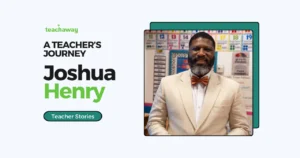Marketing isn’t just for big corporations anymore. Thanks to the internet, everyone can market themselves to further their professional career.
As an online teacher, you probably don’t have to market yourself to get a job, but an online presence can help you get ahead. When hiring for a specialized position, schools may go with the candidate they feel has more personal charm and uniqueness. It can also help you find new students to teach online.
Your goal in marketing yourself, then, should be to communicate who you are as an educator. This can even help attract the best schools to you, as they will be looking for someone who shares their values.
How do I market myself as an online teacher?
To market yourself, there are two main paths (which are not mutually exclusive):
- Putting up a website
- Promoting yourself on social media
You should aim to express yourself in whatever way you like. Some good options include:
- sharing sample materials
- asking for reviews
- writing content
- making a video intro
Putting up your own website
It’s the 2020s, and websites aren’t just for a handful of elite professionals. Instead, anyone can get a website to promote their career, and it’s easier and cheaper than ever before.
You don’t need to be a computer wizard to put up a website. Companies like Squarespace and Wix allow you to build a website and host it on their servers for a low monthly fee.
Having a website means you can lose the distracting “@gmail.com” or “@yahoo.com” address and use your domain name. It also gives you total control over the content and materials you want others to see.
And most importantly, having a website just makes you look professional. It’s easier to trust someone who has put in the time and effort to make something that anyone can see on the internet.
Plus, if you want to teach online, what better place to be than online?
Promoting yourself on social media platforms
Social media is about more than cat memes. Most companies promote themselves on social, and there is no reason why you shouldn’t either.
LinkedIn is the obvious best choice here, but you can also make educational videos for YouTube, TikTok, or Instagram stories, or share your writing on Medium. Other social media apps, like Tinder, are not an appropriate choice.
Each social media app has different rules that make you take different approaches. For example, Twitter is great for short comments about teaching, while LinkedIn is better for longer discussions about work.
Facebook groups are a great way to build your community and find potential students. Creating relationships is the best way to earn referrals and word of mouth marketing.
It’s a good idea to separate your personal from your professional social media. You can use separate accounts or reserve one channel for each.
When it comes to social media, consistency brings success. Pick one to three channels, and post regularly, at least once or twice a month.
Sharing sample materials
Whether you use a website, social media, or both, sharing sample materials is a great way to reach people. It shows that you can and do create valuable educational assets.
Depending on what you specialize in as an online teacher, sample materials can take many different forms, including:
- lesson plans
- videos
- digital flashcards
- readings
- exams and quizzes
When you share sample materials, be prepared for other teachers to use and critique them. You may want to keep the answer keys for your quizzes private.
You can also provide some context to explain how you use your materials. For example, you can demonstrate that you use your flashcards for a third-grade class or your exams for a class of 14-year-old learners.
You can also say how students responded to the materials and whether they worked or not. In fact, if you have educational materials that didn’t work well, schools might be interested to see your take on why they failed.
Asking for reviews
Reviews are objective, tangible evidence of teaching success. There are three main sources of review for teachers:
- students
- parents
- schools
Student reviews are great for showcasing your ability because they show that your students liked you enough to say something in English. Especially important if you’ll be teaching English online.
Parent reviews speak directly to the people paying for education- parents. Everybody wants the best education for their child and wants to see results.
School reviews can come from your boss, principal, or fellow teachers. They can indicate how you function in an office setting and how you tackle extra school projects.
Making a video intro
Many schools already ask for a video intro, and it can be a great way to introduce yourself, even to those who don’t. In our modern digital era, it often makes more sense than a resume.
A video intro doesn’t have to be complicated. It can be as simple as saying hello, your name, where you are from, what you teach, and so on. It can carry all the information of a resume, but with the benefit of seeing your face.
You can also add elements to a video intro, like clips from your lessons or pictures of you teaching. Some teachers also like to add personal information, like their hobbies or books they’ve read.
The point is to add a personal touch to make it feel like you are in-person and in the room.
If you’re comfortable creating content in video format, consider creating a webinar. This can help exemplify your expertise and your teaching style.
Writing content
In marketing, content is king. The average American consumes almost seven hours of content per day.
Much of the internet is a contest to see who can win the most eyeballs. But with that much content consumption, there’s still room for everyone.
SEO (Search Engine Optimization) is a worthwhile skill set to pick up to increase the visibility of your content online. Learn the basics of optimizing your online content and get to the top of the search results pages. This will help your target audience find you so you can build your client base in no time.
There are many different kinds of content, but blog writing is the obvious choice. Writing a blog about your teaching experience provides a unique and exciting window into your perspective.
You can also turn written content into video content reasonably quickly. For example, many people prefer watching vlogs to reading blogs. And there’s nothing wrong with recycling your own content to post in multiple places.
There are many different topics you can choose from when writing content, but some of the most relevant ones to consider include the following:
- Teaching methods
- English language (ESL or EFL)
- Travel
- TEFL courses / certifications
And you can always look at the Teach Away blog for inspiration!
Successfully market yourself as an online teacher and reach a wider audience
When it comes to marketing strategies, variety is the key to success. This all has to do with the number of communication channels available today.
Fifty years ago, there were only a few ways to reach people: snail mail, telegram, phone, radio, or television. But, unfortunately, most of those were inaccessible to ordinary teachers.
Today, there are more communication channels than you can count. Email, WhatsApp / SMS, Facebook, Twitter, Youtube, TikTok, Google searches, and more.
Many of these are still not accessible to the average teacher, but far more are.
While some people prefer videos, others prefer writing and others like podcasts. That means the best way to reach people is by making yourself available on as many channels as possible.
Of course, posting regularly on social media is infeasible for one person. But variety is key. If you pick a couple and post regularly, your voice will be heard.
Your goal in marketing yourself, then, should be to communicate who you are as an educator. This can even help attract the best schools to you, as they will be looking for someone who shares their values.



